Cardiologist Resume Examples

Jul 18, 2024
|
12 min read
Pulse check: boost your chances with a top cardiologist resume. Learn how to show your expertise, skills, and experience in the best light. This guide will help you craft a heart-winning resume that stands out.
Rated by 348 people
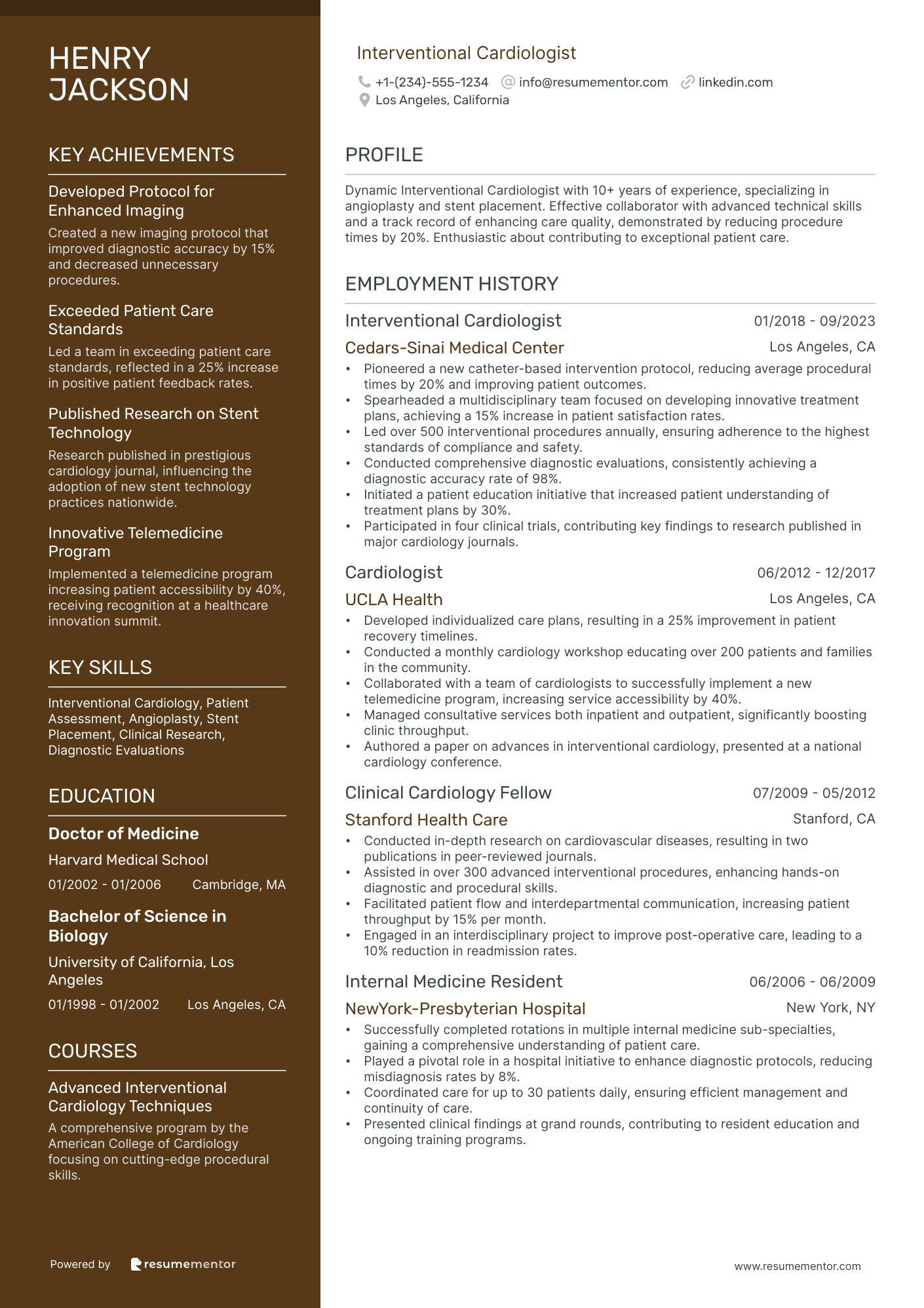
Interventional Cardiologist
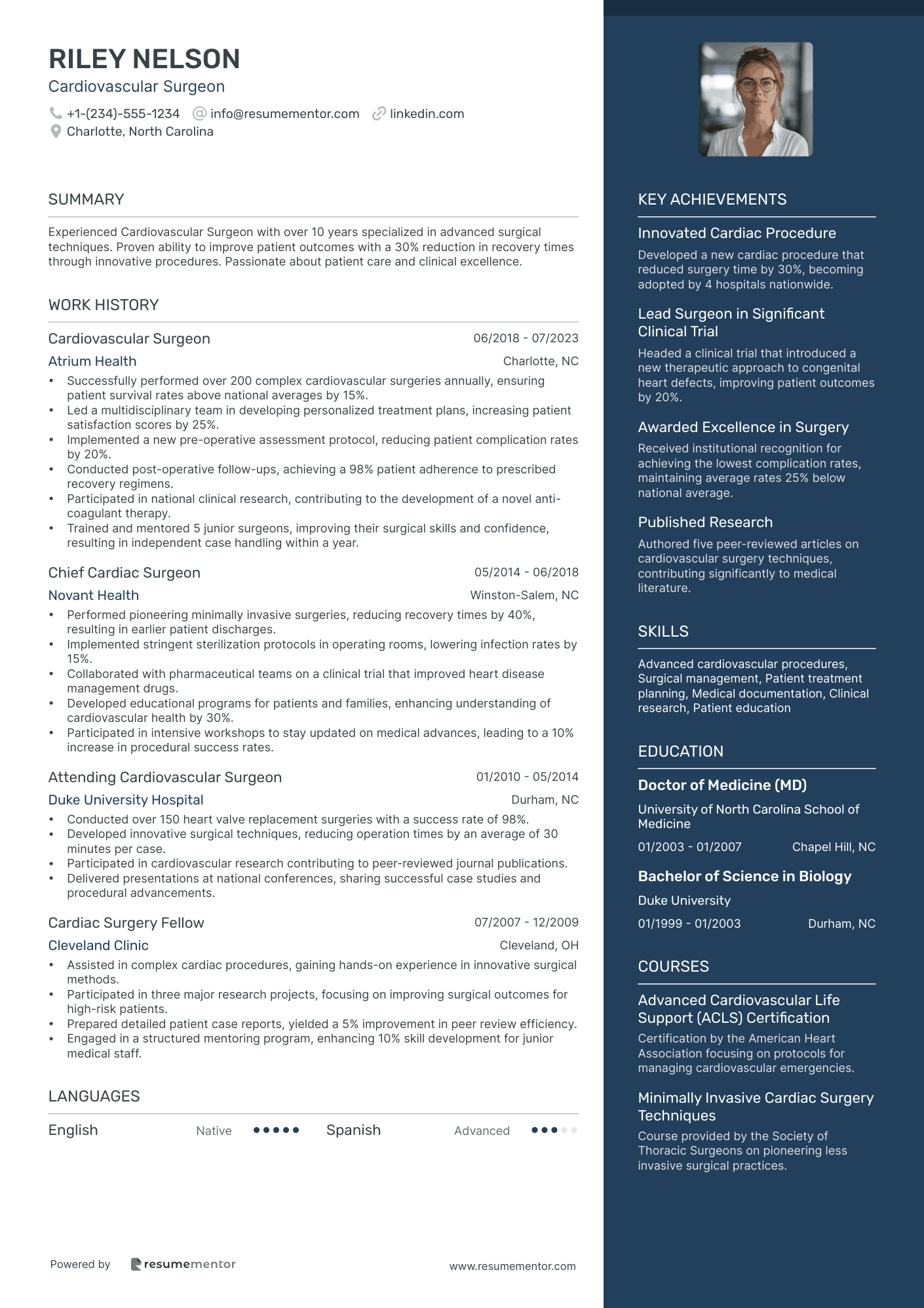
Cardiovascular Surgeon
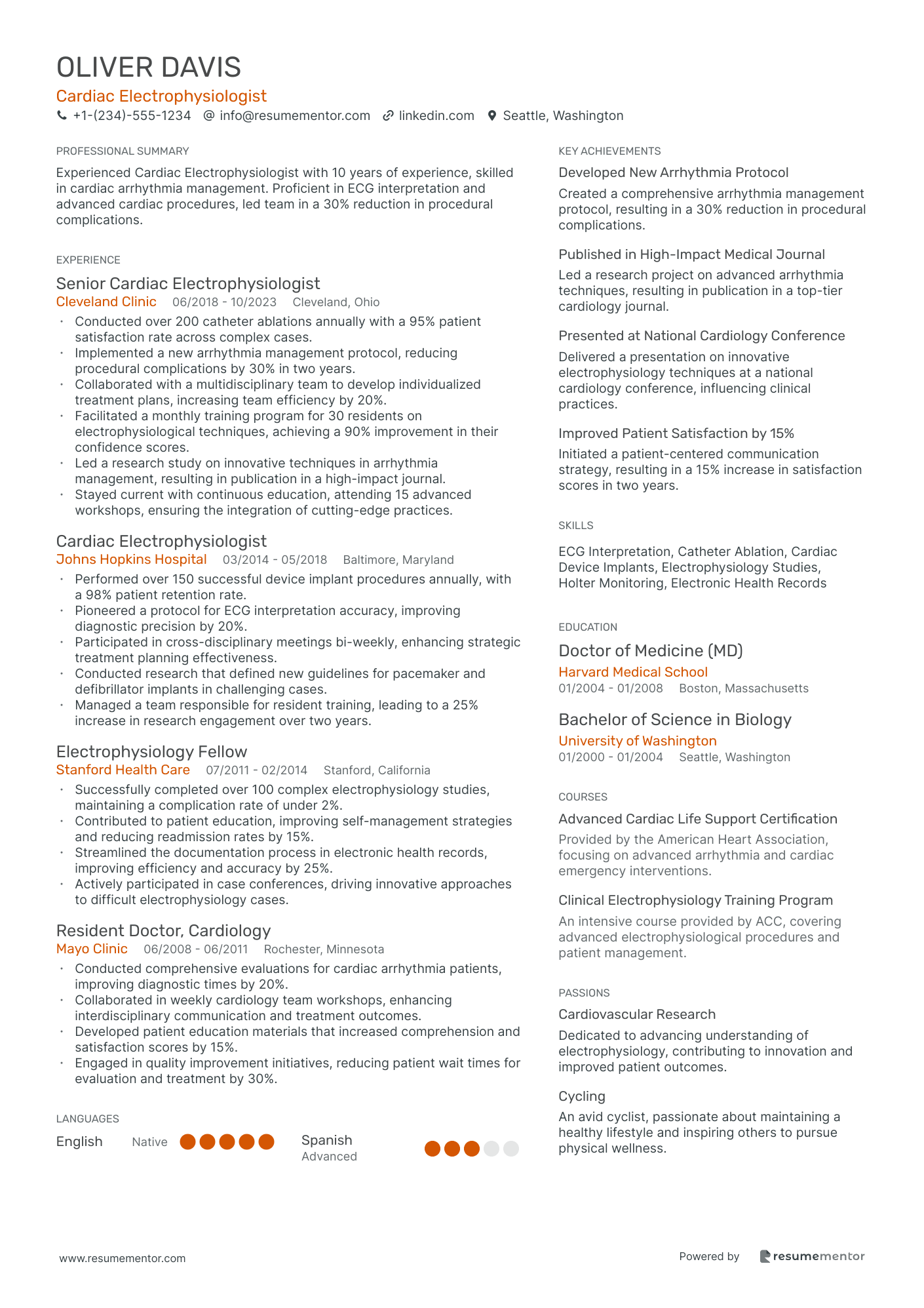
Cardiac Electrophysiologist
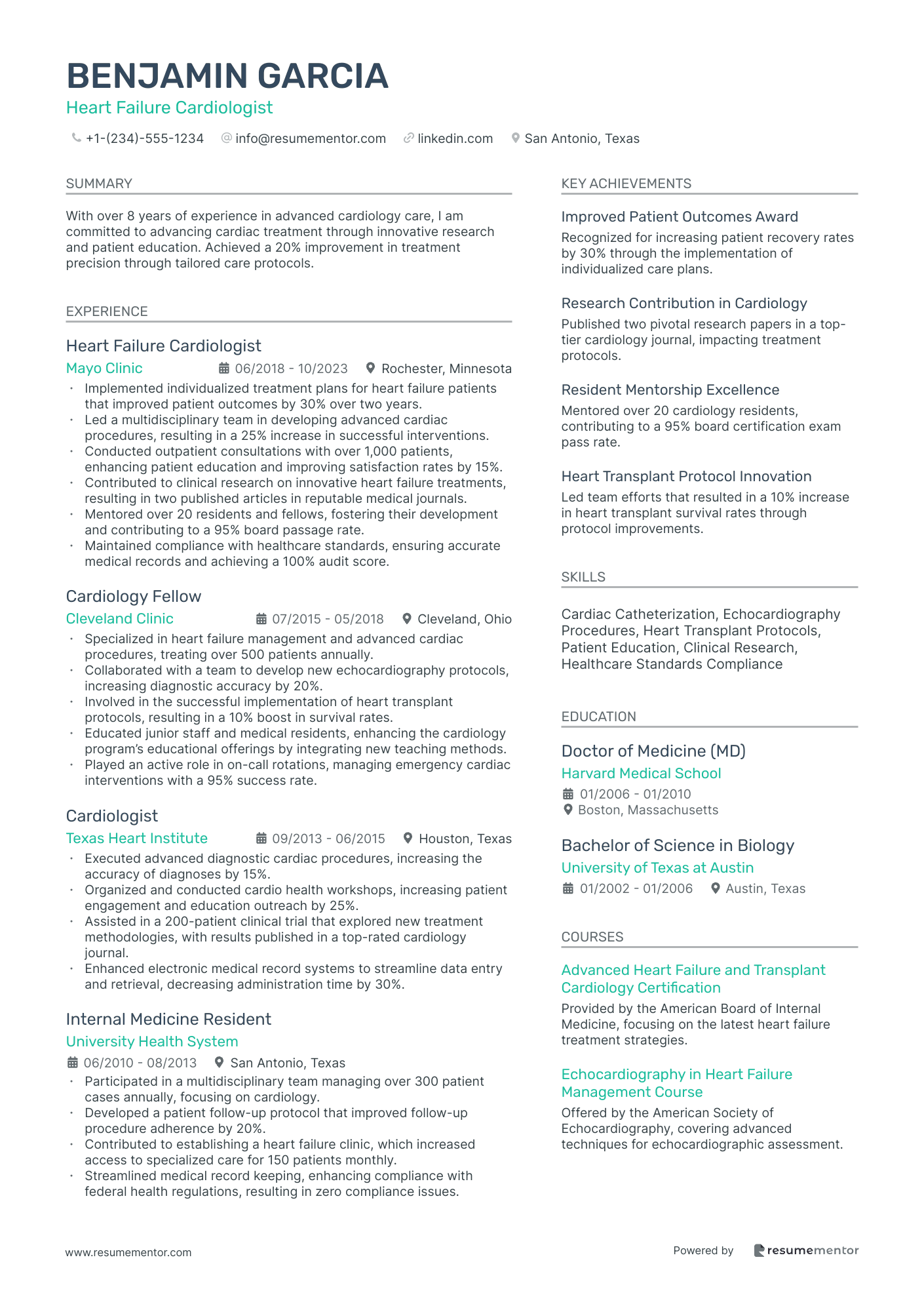
Heart Failure Cardiologist
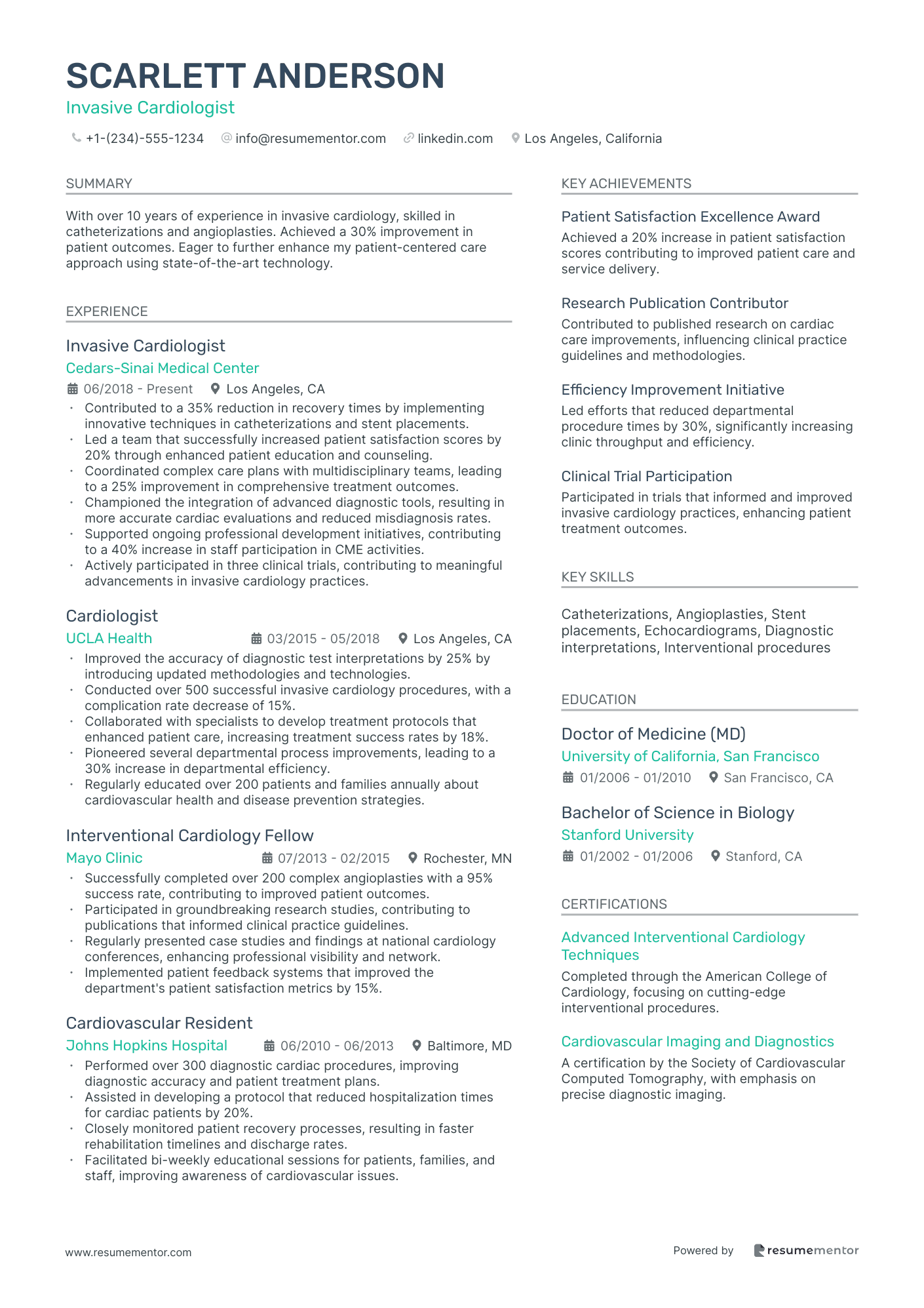
Invasive Cardiologist
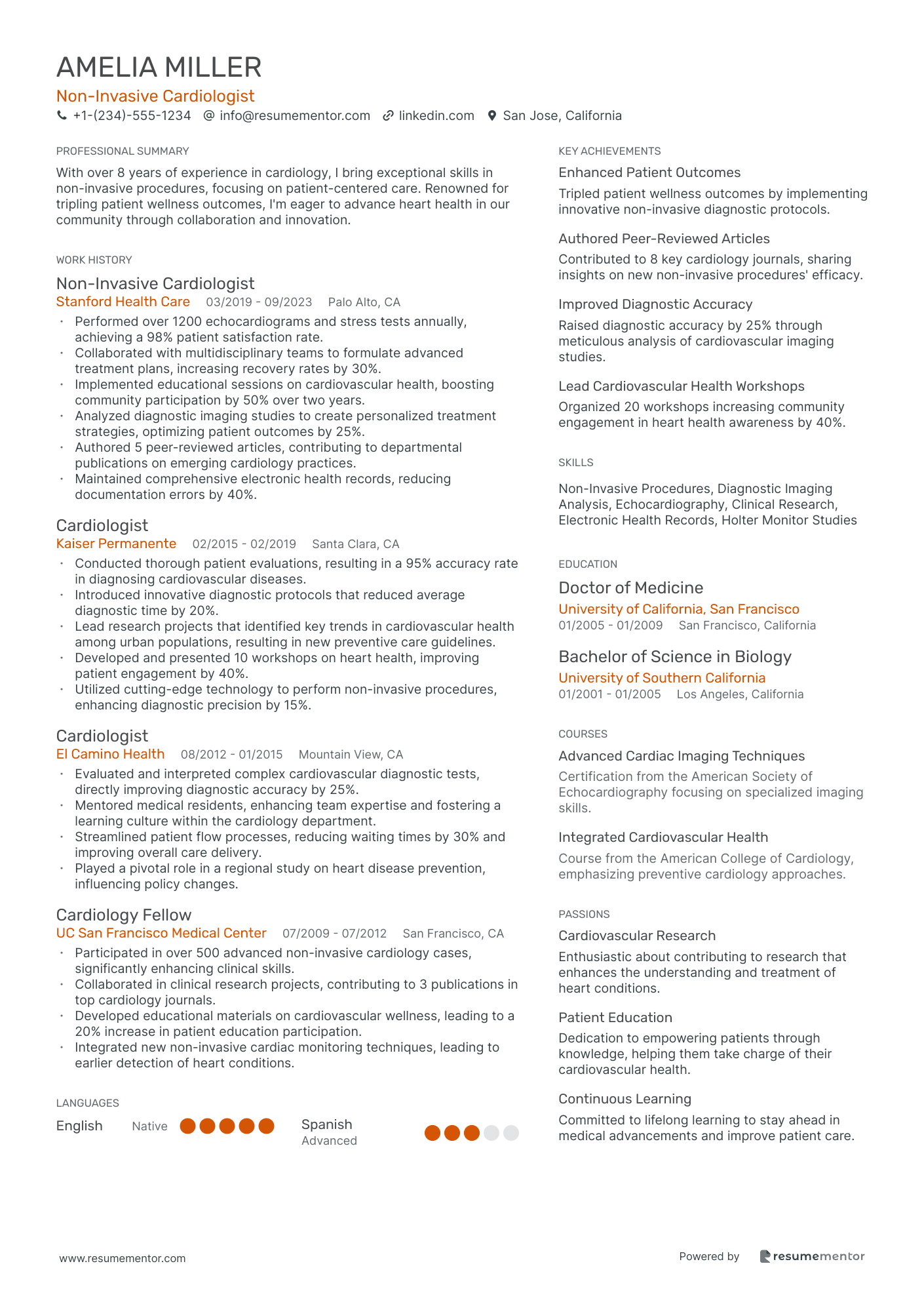
Non-Invasive Cardiologist
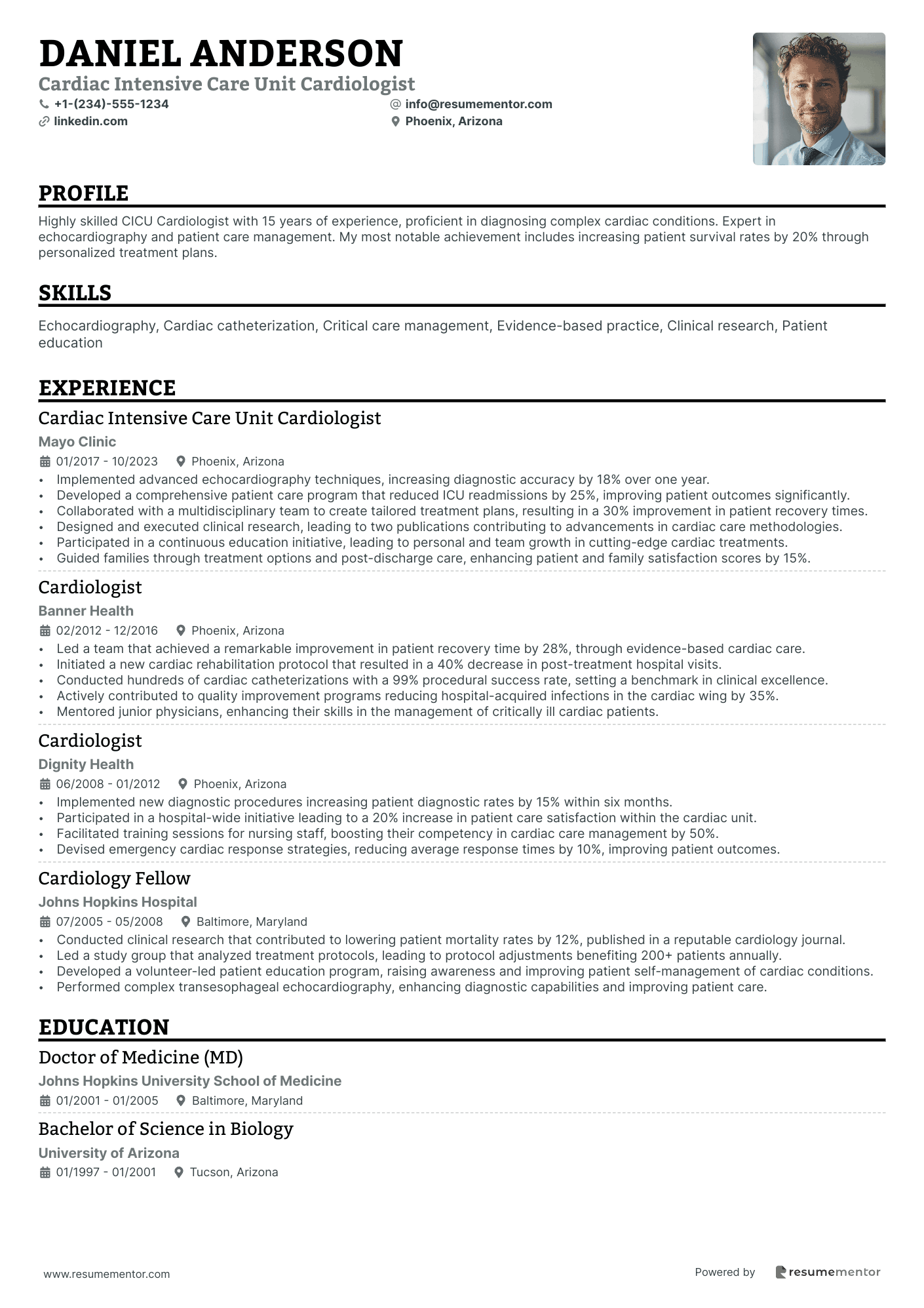
Cardiac Intensive Care Unit Cardiologist
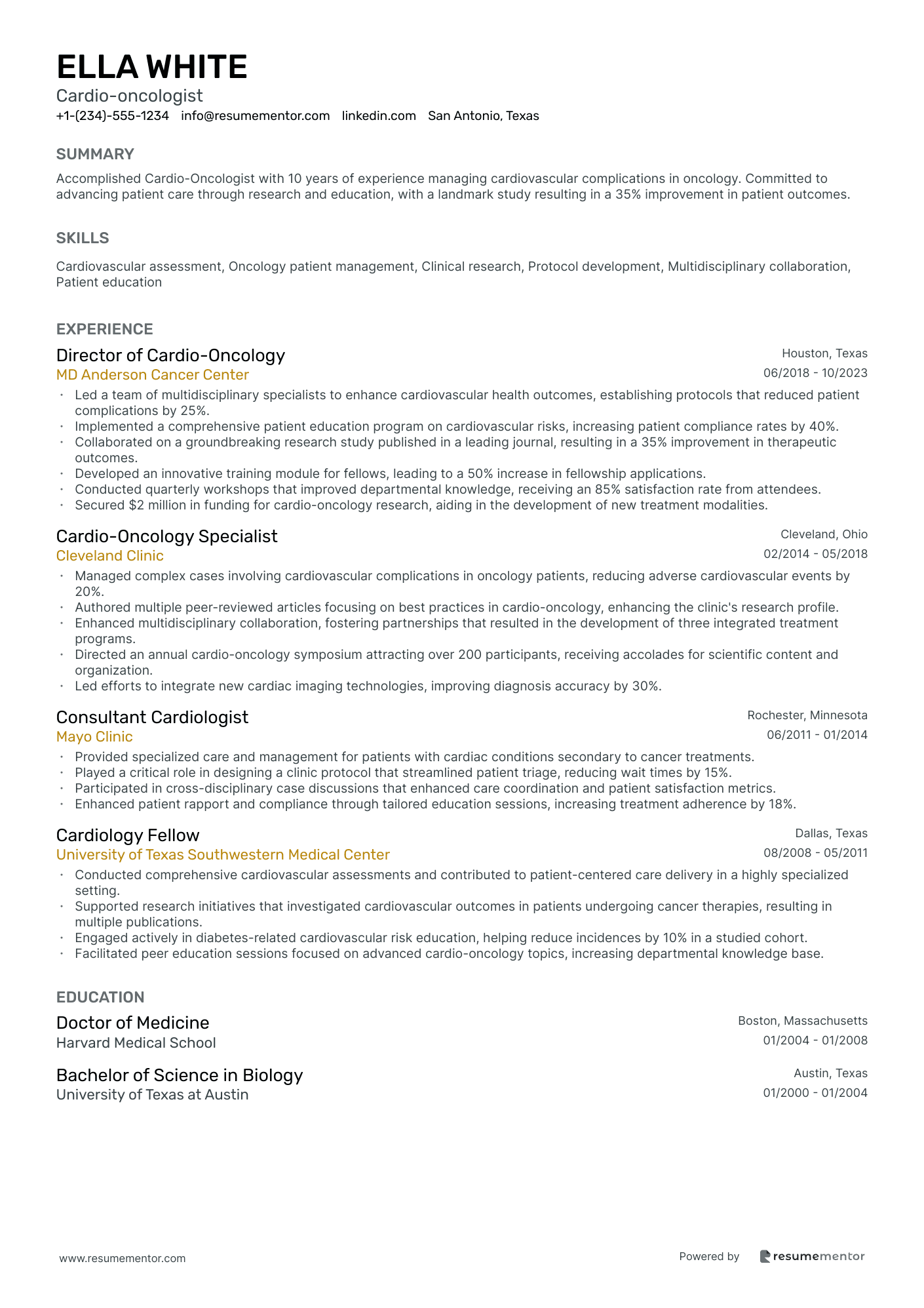
Cardio-oncologist
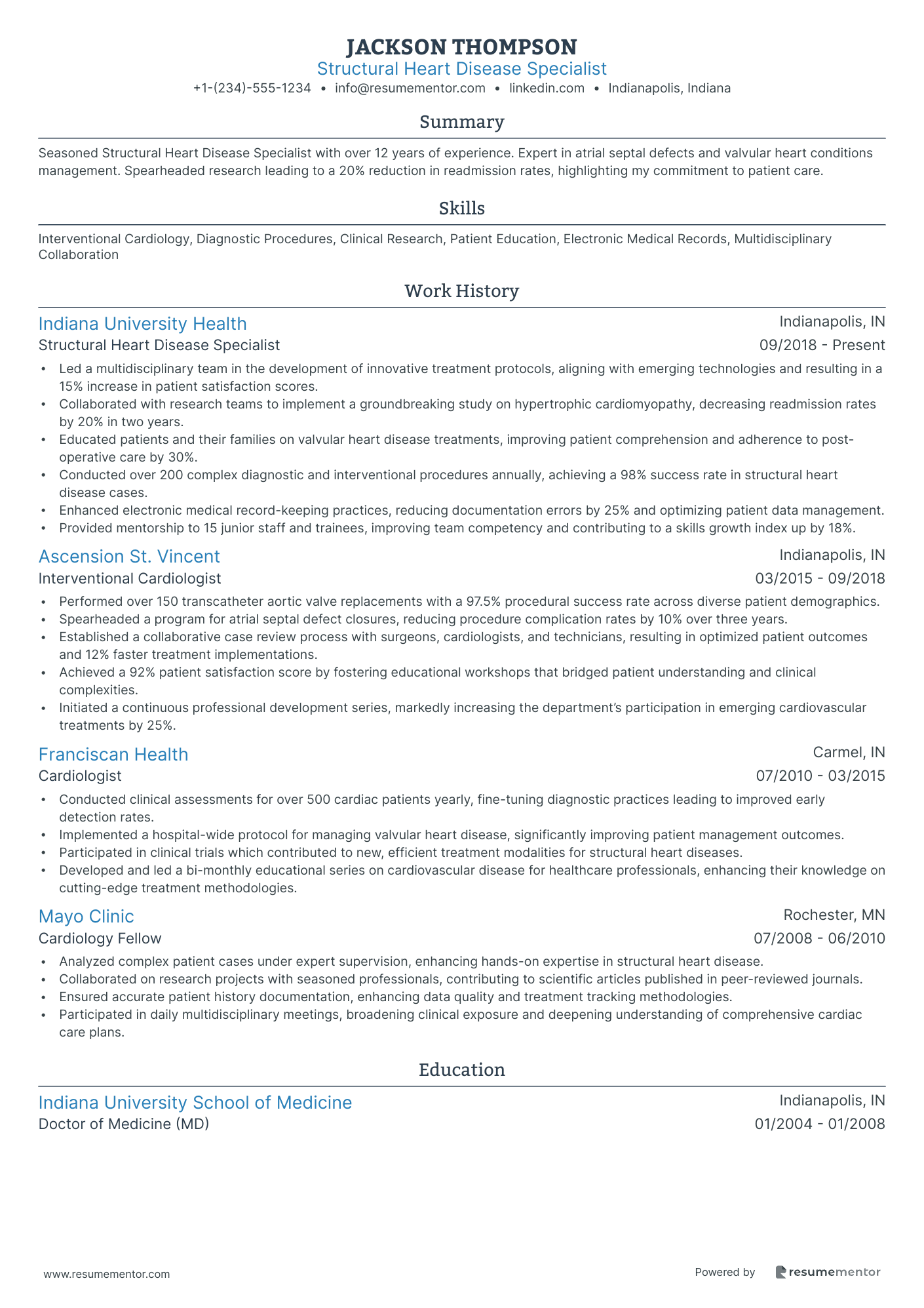
Structural Heart Disease Specialist

Interventional Cardiologist resume sample
- •Pioneered a new catheter-based intervention protocol, reducing average procedural times by 20% and improving patient outcomes.
- •Spearheaded a multidisciplinary team focused on developing innovative treatment plans, achieving a 15% increase in patient satisfaction rates.
- •Led over 500 interventional procedures annually, ensuring adherence to the highest standards of compliance and safety.
- •Conducted comprehensive diagnostic evaluations, consistently achieving a diagnostic accuracy rate of 98%.
- •Initiated a patient education initiative that increased patient understanding of treatment plans by 30%.
- •Participated in four clinical trials, contributing key findings to research published in major cardiology journals.
- •Developed individualized care plans, resulting in a 25% improvement in patient recovery timelines.
- •Conducted a monthly cardiology workshop educating over 200 patients and families in the community.
- •Collaborated with a team of cardiologists to successfully implement a new telemedicine program, increasing service accessibility by 40%.
- •Managed consultative services both inpatient and outpatient, significantly boosting clinic throughput.
- •Authored a paper on advances in interventional cardiology, presented at a national cardiology conference.
- •Conducted in-depth research on cardiovascular diseases, resulting in two publications in peer-reviewed journals.
- •Assisted in over 300 advanced interventional procedures, enhancing hands-on diagnostic and procedural skills.
- •Facilitated patient flow and interdepartmental communication, increasing patient throughput by 15% per month.
- •Engaged in an interdisciplinary project to improve post-operative care, leading to a 10% reduction in readmission rates.
- •Successfully completed rotations in multiple internal medicine sub-specialties, gaining a comprehensive understanding of patient care.
- •Played a pivotal role in a hospital initiative to enhance diagnostic protocols, reducing misdiagnosis rates by 8%.
- •Coordinated care for up to 30 patients daily, ensuring efficient management and continuity of care.
- •Presented clinical findings at grand rounds, contributing to resident education and ongoing training programs.
Cardiovascular Surgeon resume sample
- •Successfully performed over 200 complex cardiovascular surgeries annually, ensuring patient survival rates above national averages by 15%.
- •Led a multidisciplinary team in developing personalized treatment plans, increasing patient satisfaction scores by 25%.
- •Implemented a new pre-operative assessment protocol, reducing patient complication rates by 20%.
- •Conducted post-operative follow-ups, achieving a 98% patient adherence to prescribed recovery regimens.
- •Participated in national clinical research, contributing to the development of a novel anti-coagulant therapy.
- •Trained and mentored 5 junior surgeons, improving their surgical skills and confidence, resulting in independent case handling within a year.
- •Performed pioneering minimally invasive surgeries, reducing recovery times by 40%, resulting in earlier patient discharges.
- •Implemented stringent sterilization protocols in operating rooms, lowering infection rates by 15%.
- •Collaborated with pharmaceutical teams on a clinical trial that improved heart disease management drugs.
- •Developed educational programs for patients and families, enhancing understanding of cardiovascular health by 30%.
- •Participated in intensive workshops to stay updated on medical advances, leading to a 10% increase in procedural success rates.
- •Conducted over 150 heart valve replacement surgeries with a success rate of 98%.
- •Developed innovative surgical techniques, reducing operation times by an average of 30 minutes per case.
- •Participated in cardiovascular research contributing to peer-reviewed journal publications.
- •Delivered presentations at national conferences, sharing successful case studies and procedural advancements.
- •Assisted in complex cardiac procedures, gaining hands-on experience in innovative surgical methods.
- •Participated in three major research projects, focusing on improving surgical outcomes for high-risk patients.
- •Prepared detailed patient case reports, yielded a 5% improvement in peer review efficiency.
- •Engaged in a structured mentoring program, enhancing 10% skill development for junior medical staff.
Cardiac Electrophysiologist resume sample
- •Conducted over 200 catheter ablations annually with a 95% patient satisfaction rate across complex cases.
- •Implemented a new arrhythmia management protocol, reducing procedural complications by 30% in two years.
- •Collaborated with a multidisciplinary team to develop individualized treatment plans, increasing team efficiency by 20%.
- •Facilitated a monthly training program for 30 residents on electrophysiological techniques, achieving a 90% improvement in their confidence scores.
- •Led a research study on innovative techniques in arrhythmia management, resulting in publication in a high-impact journal.
- •Stayed current with continuous education, attending 15 advanced workshops, ensuring the integration of cutting-edge practices.
- •Performed over 150 successful device implant procedures annually, with a 98% patient retention rate.
- •Pioneered a protocol for ECG interpretation accuracy, improving diagnostic precision by 20%.
- •Participated in cross-disciplinary meetings bi-weekly, enhancing strategic treatment planning effectiveness.
- •Conducted research that defined new guidelines for pacemaker and defibrillator implants in challenging cases.
- •Managed a team responsible for resident training, leading to a 25% increase in research engagement over two years.
- •Successfully completed over 100 complex electrophysiology studies, maintaining a complication rate of under 2%.
- •Contributed to patient education, improving self-management strategies and reducing readmission rates by 15%.
- •Streamlined the documentation process in electronic health records, improving efficiency and accuracy by 25%.
- •Actively participated in case conferences, driving innovative approaches to difficult electrophysiology cases.
- •Conducted comprehensive evaluations for cardiac arrhythmia patients, improving diagnostic times by 20%.
- •Collaborated in weekly cardiology team workshops, enhancing interdisciplinary communication and treatment outcomes.
- •Developed patient education materials that increased comprehension and satisfaction scores by 15%.
- •Engaged in quality improvement initiatives, reducing patient wait times for evaluation and treatment by 30%.
Heart Failure Cardiologist resume sample
- •Implemented individualized treatment plans for heart failure patients that improved patient outcomes by 30% over two years.
- •Led a multidisciplinary team in developing advanced cardiac procedures, resulting in a 25% increase in successful interventions.
- •Conducted outpatient consultations with over 1,000 patients, enhancing patient education and improving satisfaction rates by 15%.
- •Contributed to clinical research on innovative heart failure treatments, resulting in two published articles in reputable medical journals.
- •Mentored over 20 residents and fellows, fostering their development and contributing to a 95% board passage rate.
- •Maintained compliance with healthcare standards, ensuring accurate medical records and achieving a 100% audit score.
- •Specialized in heart failure management and advanced cardiac procedures, treating over 500 patients annually.
- •Collaborated with a team to develop new echocardiography protocols, increasing diagnostic accuracy by 20%.
- •Involved in the successful implementation of heart transplant protocols, resulting in a 10% boost in survival rates.
- •Educated junior staff and medical residents, enhancing the cardiology program’s educational offerings by integrating new teaching methods.
- •Played an active role in on-call rotations, managing emergency cardiac interventions with a 95% success rate.
- •Executed advanced diagnostic cardiac procedures, increasing the accuracy of diagnoses by 15%.
- •Organized and conducted cardio health workshops, increasing patient engagement and education outreach by 25%.
- •Assisted in a 200-patient clinical trial that explored new treatment methodologies, with results published in a top-rated cardiology journal.
- •Enhanced electronic medical record systems to streamline data entry and retrieval, decreasing administration time by 30%.
- •Participated in a multidisciplinary team managing over 300 patient cases annually, focusing on cardiology.
- •Developed a patient follow-up protocol that improved follow-up procedure adherence by 20%.
- •Contributed to establishing a heart failure clinic, which increased access to specialized care for 150 patients monthly.
- •Streamlined medical record keeping, enhancing compliance with federal health regulations, resulting in zero compliance issues.
Invasive Cardiologist resume sample
- •Contributed to a 35% reduction in recovery times by implementing innovative techniques in catheterizations and stent placements.
- •Led a team that successfully increased patient satisfaction scores by 20% through enhanced patient education and counseling.
- •Coordinated complex care plans with multidisciplinary teams, leading to a 25% improvement in comprehensive treatment outcomes.
- •Championed the integration of advanced diagnostic tools, resulting in more accurate cardiac evaluations and reduced misdiagnosis rates.
- •Supported ongoing professional development initiatives, contributing to a 40% increase in staff participation in CME activities.
- •Actively participated in three clinical trials, contributing to meaningful advancements in invasive cardiology practices.
- •Improved the accuracy of diagnostic test interpretations by 25% by introducing updated methodologies and technologies.
- •Conducted over 500 successful invasive cardiology procedures, with a complication rate decrease of 15%.
- •Collaborated with specialists to develop treatment protocols that enhanced patient care, increasing treatment success rates by 18%.
- •Pioneered several departmental process improvements, leading to a 30% increase in departmental efficiency.
- •Regularly educated over 200 patients and families annually about cardiovascular health and disease prevention strategies.
- •Successfully completed over 200 complex angioplasties with a 95% success rate, contributing to improved patient outcomes.
- •Participated in groundbreaking research studies, contributing to publications that informed clinical practice guidelines.
- •Regularly presented case studies and findings at national cardiology conferences, enhancing professional visibility and network.
- •Implemented patient feedback systems that improved the department's patient satisfaction metrics by 15%.
- •Performed over 300 diagnostic cardiac procedures, improving diagnostic accuracy and patient treatment plans.
- •Assisted in developing a protocol that reduced hospitalization times for cardiac patients by 20%.
- •Closely monitored patient recovery processes, resulting in faster rehabilitation timelines and discharge rates.
- •Facilitated bi-weekly educational sessions for patients, families, and staff, improving awareness of cardiovascular issues.
Non-Invasive Cardiologist resume sample
- •Performed over 1200 echocardiograms and stress tests annually, achieving a 98% patient satisfaction rate.
- •Collaborated with multidisciplinary teams to formulate advanced treatment plans, increasing recovery rates by 30%.
- •Implemented educational sessions on cardiovascular health, boosting community participation by 50% over two years.
- •Analyzed diagnostic imaging studies to create personalized treatment strategies, optimizing patient outcomes by 25%.
- •Authored 5 peer-reviewed articles, contributing to departmental publications on emerging cardiology practices.
- •Maintained comprehensive electronic health records, reducing documentation errors by 40%.
- •Conducted thorough patient evaluations, resulting in a 95% accuracy rate in diagnosing cardiovascular diseases.
- •Introduced innovative diagnostic protocols that reduced average diagnostic time by 20%.
- •Lead research projects that identified key trends in cardiovascular health among urban populations, resulting in new preventive care guidelines.
- •Developed and presented 10 workshops on heart health, improving patient engagement by 40%.
- •Utilized cutting-edge technology to perform non-invasive procedures, enhancing diagnostic precision by 15%.
- •Evaluated and interpreted complex cardiovascular diagnostic tests, directly improving diagnostic accuracy by 25%.
- •Mentored medical residents, enhancing team expertise and fostering a learning culture within the cardiology department.
- •Streamlined patient flow processes, reducing waiting times by 30% and improving overall care delivery.
- •Played a pivotal role in a regional study on heart disease prevention, influencing policy changes.
- •Participated in over 500 advanced non-invasive cardiology cases, significantly enhancing clinical skills.
- •Collaborated in clinical research projects, contributing to 3 publications in top cardiology journals.
- •Developed educational materials on cardiovascular wellness, leading to a 20% increase in patient education participation.
- •Integrated new non-invasive cardiac monitoring techniques, leading to earlier detection of heart conditions.
Cardiac Intensive Care Unit Cardiologist resume sample
- •Implemented advanced echocardiography techniques, increasing diagnostic accuracy by 18% over one year.
- •Developed a comprehensive patient care program that reduced ICU readmissions by 25%, improving patient outcomes significantly.
- •Collaborated with a multidisciplinary team to create tailored treatment plans, resulting in a 30% improvement in patient recovery times.
- •Designed and executed clinical research, leading to two publications contributing to advancements in cardiac care methodologies.
- •Participated in a continuous education initiative, leading to personal and team growth in cutting-edge cardiac treatments.
- •Guided families through treatment options and post-discharge care, enhancing patient and family satisfaction scores by 15%.
- •Led a team that achieved a remarkable improvement in patient recovery time by 28%, through evidence-based cardiac care.
- •Initiated a new cardiac rehabilitation protocol that resulted in a 40% decrease in post-treatment hospital visits.
- •Conducted hundreds of cardiac catheterizations with a 99% procedural success rate, setting a benchmark in clinical excellence.
- •Actively contributed to quality improvement programs reducing hospital-acquired infections in the cardiac wing by 35%.
- •Mentored junior physicians, enhancing their skills in the management of critically ill cardiac patients.
- •Implemented new diagnostic procedures increasing patient diagnostic rates by 15% within six months.
- •Participated in a hospital-wide initiative leading to a 20% increase in patient care satisfaction within the cardiac unit.
- •Facilitated training sessions for nursing staff, boosting their competency in cardiac care management by 50%.
- •Devised emergency cardiac response strategies, reducing average response times by 10%, improving patient outcomes.
- •Conducted clinical research that contributed to lowering patient mortality rates by 12%, published in a reputable cardiology journal.
- •Led a study group that analyzed treatment protocols, leading to protocol adjustments benefiting 200+ patients annually.
- •Developed a volunteer-led patient education program, raising awareness and improving patient self-management of cardiac conditions.
- •Performed complex transesophageal echocardiography, enhancing diagnostic capabilities and improving patient care.
Cardio-oncologist resume sample
- •Led a team of multidisciplinary specialists to enhance cardiovascular health outcomes, establishing protocols that reduced patient complications by 25%.
- •Implemented a comprehensive patient education program on cardiovascular risks, increasing patient compliance rates by 40%.
- •Collaborated on a groundbreaking research study published in a leading journal, resulting in a 35% improvement in therapeutic outcomes.
- •Developed an innovative training module for fellows, leading to a 50% increase in fellowship applications.
- •Conducted quarterly workshops that improved departmental knowledge, receiving an 85% satisfaction rate from attendees.
- •Secured $2 million in funding for cardio-oncology research, aiding in the development of new treatment modalities.
- •Managed complex cases involving cardiovascular complications in oncology patients, reducing adverse cardiovascular events by 20%.
- •Authored multiple peer-reviewed articles focusing on best practices in cardio-oncology, enhancing the clinic's research profile.
- •Enhanced multidisciplinary collaboration, fostering partnerships that resulted in the development of three integrated treatment programs.
- •Directed an annual cardio-oncology symposium attracting over 200 participants, receiving accolades for scientific content and organization.
- •Led efforts to integrate new cardiac imaging technologies, improving diagnosis accuracy by 30%.
- •Provided specialized care and management for patients with cardiac conditions secondary to cancer treatments.
- •Played a critical role in designing a clinic protocol that streamlined patient triage, reducing wait times by 15%.
- •Participated in cross-disciplinary case discussions that enhanced care coordination and patient satisfaction metrics.
- •Enhanced patient rapport and compliance through tailored education sessions, increasing treatment adherence by 18%.
- •Conducted comprehensive cardiovascular assessments and contributed to patient-centered care delivery in a highly specialized setting.
- •Supported research initiatives that investigated cardiovascular outcomes in patients undergoing cancer therapies, resulting in multiple publications.
- •Engaged actively in diabetes-related cardiovascular risk education, helping reduce incidences by 10% in a studied cohort.
- •Facilitated peer education sessions focused on advanced cardio-oncology topics, increasing departmental knowledge base.
Structural Heart Disease Specialist resume sample
- •Led a multidisciplinary team in the development of innovative treatment protocols, aligning with emerging technologies and resulting in a 15% increase in patient satisfaction scores.
- •Collaborated with research teams to implement a groundbreaking study on hypertrophic cardiomyopathy, decreasing readmission rates by 20% in two years.
- •Educated patients and their families on valvular heart disease treatments, improving patient comprehension and adherence to post-operative care by 30%.
- •Conducted over 200 complex diagnostic and interventional procedures annually, achieving a 98% success rate in structural heart disease cases.
- •Enhanced electronic medical record-keeping practices, reducing documentation errors by 25% and optimizing patient data management.
- •Provided mentorship to 15 junior staff and trainees, improving team competency and contributing to a skills growth index up by 18%.
- •Performed over 150 transcatheter aortic valve replacements with a 97.5% procedural success rate across diverse patient demographics.
- •Spearheaded a program for atrial septal defect closures, reducing procedure complication rates by 10% over three years.
- •Established a collaborative case review process with surgeons, cardiologists, and technicians, resulting in optimized patient outcomes and 12% faster treatment implementations.
- •Achieved a 92% patient satisfaction score by fostering educational workshops that bridged patient understanding and clinical complexities.
- •Initiated a continuous professional development series, markedly increasing the department’s participation in emerging cardiovascular treatments by 25%.
- •Conducted clinical assessments for over 500 cardiac patients yearly, fine-tuning diagnostic practices leading to improved early detection rates.
- •Implemented a hospital-wide protocol for managing valvular heart disease, significantly improving patient management outcomes.
- •Participated in clinical trials which contributed to new, efficient treatment modalities for structural heart diseases.
- •Developed and led a bi-monthly educational series on cardiovascular disease for healthcare professionals, enhancing their knowledge on cutting-edge treatment methodologies.
- •Analyzed complex patient cases under expert supervision, enhancing hands-on expertise in structural heart disease.
- •Collaborated on research projects with seasoned professionals, contributing to scientific articles published in peer-reviewed journals.
- •Ensured accurate patient history documentation, enhancing data quality and treatment tracking methodologies.
- •Participated in daily multidisciplinary meetings, broadening clinical exposure and deepening understanding of comprehensive cardiac care plans.
Crafting a standout resume as a cardiologist can feel like navigating a complex heart procedure, where precision and clarity are crucial. You need to balance your medical expertise, like performing angioplasties and interpreting ECGs, with your achievements in research and teaching. This task becomes even more challenging in a competitive job market, where effectively communicating your value is essential.
It often feels like a daunting task to condense your extensive experience into a single page without losing important details. Your challenge is to weave your clinical skills seamlessly with your communication abilities, making sure they align with what potential employers seek.
This is where a resume template becomes invaluable. By using a well-structured template from ResumeMentor, you can lay a solid foundation that allows you to highlight your key achievements. Presenting your patient-care excellence and advanced cardiac knowledge in a clear and compelling way is crucial.
In a field where every detail matters, your resume needs to capture the essence of your leadership and expertise. By focusing on your unique contributions, you can create a document that not only grabs attention but also secures interviews. A polished resume serves as your advocate, clearly conveying your potential impact in an organization.
Key Takeaways
- Precision and clarity are paramount when writing a cardiologist resume, focusing on effectively communicating your medical expertise and achievements.
- A well-structured resume template can highlight key achievements such as patient-care excellence and advanced cardiac knowledge.
- The resume should seamlessly integrate clinical skills with communication abilities, tailored to what potential employers seek.
- Choosing the right format and font is essential to maintaining a professional appearance and ensuring your resume is easily absorbed by hiring managers.
- Quantifying accomplishments with strong action verbs and metrics can emphasize leadership skills and the positive impact of your work.
What to focus on when writing your cardiologist resume
A cardiologist's resume should effectively communicate your expertise in heart care and dedication to delivering exceptional patient service. This involves highlighting your qualifications, experience, and skills essential for excelling in this specialized field of medicine. Your resume should weave together a comprehensive story of your ability to diagnose and treat cardiovascular diseases with precision and care.
How to structure your cardiologist resume
- Contact Information: Start by including your full name, phone number, and email address—ensuring this section is clear and easy to find, as it's your initial point of contact. Adding a LinkedIn profile or a professional webpage link can also give recruiters a broader view of your career highlights. This information serves as your professional introduction, so clarity and accessibility are key.
- Professional Summary: Follow with a concise paragraph that ties together your experience and key skills in cardiology—showcasing your commitment to patient care and proficiency in cardiovascular diagnostics. This is your elevator pitch, where you summarize your professional identity and career goals. Use this section to emphasize how your unique skills and experiences make you an ideal candidate for the position.
- Education: Build on this by listing your medical degrees, the institutions you attended, and your graduation dates—highlighting any specialized training or residencies that further solidify your expertise. This section should reflect your commitment to education and lifelong learning, indicating both foundational and advanced knowledge pertinent to cardiology.
- Professional Experience: Your work history should flow logically, emphasizing cardiology roles where you can detail achievements like successful treatments or noteworthy research contributions—showcasing your real-world impact and leadership within the field. This is where you connect your everyday responsibilities to significant accomplishments that demonstrate your capability and dedication.
- Certifications and Licenses: This naturally leads to your certifications, such as Board Certification in Cardiology, alongside any state practice licenses—reinforcing your qualifications and your commitment to maintaining professional standards. Make sure to include any additional credentials that set you apart and underscore your authority in the field.
- Clinical Skills: Round out your resume by spotlighting specific technical skills in cardiology, like EKG interpretation or advanced interventional procedures—underscoring your clinical competence and readiness to perform at a high level. Mentioning these skills in detail not only highlights your hands-on expertise but also shows your adaptability in different clinical environments.
For additional depth, consider including sections like Research Contributions, Conference Presentations, or Professional Affiliations—demonstrating your active engagement in the cardiology community. Below, we'll cover each section more in-depth as we explore the best resume format to ensure your information is presented clearly and effectively.
Which resume format to choose
Creating a standout cardiologist resume starts with selecting the right format. A reverse-chronological layout is ideal for showcasing your medical experience and education, especially important in a field where recent advancements and practices are crucial. This structure guides employers through your career journey, emphasizing your progress and current capabilities.
Selecting a suitable font enhances the professional appearance of your resume. Fonts like Raleway, Lato, or Montserrat maintain readability while imparting a modern feel that aligns with the cutting-edge nature of cardiology. These fonts contribute to a clean, approachable design, making it easy for hiring managers to absorb your key skills and experiences.
File format plays a critical role, too. Saving your resume as a PDF is vital for maintaining consistent formatting across different devices and platforms. This ensures your meticulously formatted document reflects the professionalism expected in the medical field, leaving a strong impression.
Paying attention to margins is also essential in crafting your resume. One-inch margins on all sides offer a balanced layout, providing ample space for your achievements without overwhelming the page. This clear presentation supports the goal of conveying your qualifications effectively, making it easier for potential employers to focus on what you bring to their team.
How to write a quantifiable resume experience section
A strong cardiologist resume experience section seamlessly highlights your expertise by focusing on your accomplishments and their impact. This part of your resume should emphasize concrete results and align your experiences with the job descriptions you're targeting. Start with your most recent roles in reverse chronological order, covering the past 10-15 years and centering on positions directly related to cardiology. By using job titles that reflect your cardiology experience, you can tailor your resume to each application, spotlighting experiences that best match the role.
To make your achievements stand out, incorporate powerful action verbs like "improved," "led," "developed," and "achieved." These verbs highlight your active contributions and the impact you've made. By beginning each bullet point with these words, you provide clear, quantifiable outcomes, such as percentages or numbers, offering precise insights into your contributions.
- •Implemented a new minimally invasive procedure that increased surgery success rates by 25%.
- •Reduced patient recovery time by 20% through enhanced post-operative care protocols.
- •Led a research team that published 5 papers in high-impact cardiology journals.
- •Increased patient satisfaction scores by 15% through improved consultation approaches.
The experience section effectively connects your achievements by detailing how they led to substantial improvements. Using strong verbs underscores your leadership skills while providing clear examples of how you’ve enhanced patient outcomes and contributed to research. Each point builds on the last, creating a compelling narrative that reflects your skills. Tailored bullet points, backed by specific data, ensure your resume communicates the value you bring, capturing the interest of potential employers with both impact and memorability.
Growth-Focused resume experience section
A growth-focused cardiologist resume experience section should effectively illustrate how your contributions have led to significant advancements in patient care and departmental success. Emphasize how you've driven growth through innovative techniques, successful collaborations, or research advancements. For instance, share concrete outcomes like increased patient satisfaction, enhanced treatment protocols, or successful research projects that have brought practice improvements or recognition in your field.
Begin by detailing your most recent role, including the job title, workplace, and employment dates. Use bullet points to clearly outline your achievements, enhancing readability and capturing the attention of hiring managers. Your narrative should reflect continuous professional growth while demonstrating your commitment to cardiology. Each example should cohesively show how your efforts have substantially enriched the success of previous employers or the broader medical landscape.
Senior Cardiologist
Heart Health Hospital
January 2018 - Present
- Developed a new patient management system that cut waiting times by 30%, significantly boosting patient satisfaction scores by 25%.
- Led a multidisciplinary team to create an innovative treatment protocol, which improved recovery rates for cardiac patients by 15%, showcasing teamwork and effective leadership.
- Authored and published three peer-reviewed research papers on cutting-edge cardiac therapies, thereby raising the hospital's profile in the medical community and highlighting a commitment to research.
- Conducted regular workshops and seminars for junior staff, fostering a culture of continuous learning and professional growth, which contributed to overall departmental improvement.
Problem-Solving Focused resume experience section
A Problem-Solving Focused cardiologist resume experience section should seamlessly present your expertise and the positive outcomes you have achieved throughout your career. Begin by highlighting your skills in diagnosing complex cardiovascular conditions, showcasing your proactive approach to patient care. Include specifics about the procedures you excel in, such as angioplasties or echocardiograms, while also illustrating the innovative techniques you've brought to the table. Weave in stories where your critical thinking directly led to improved patient outcomes, emphasizing how these instances enhanced team efficiency as well.
Using bullet points, clearly and effectively communicate your accomplishments and skills. Each point should focus on significant achievements, illustrating your ability to collaborate with other medical professionals in tackling intricate health issues. Emphasize any leadership roles and share experiences in research or teaching, which reflect your dedication to advancing the field of cardiology. This comprehensive approach will eloquently highlight your problem-solving prowess and solidify your effectiveness as a cardiologist.
Cardiologist
Heart Health Hospital
January 2010 - Present
- Implemented a new diagnostic protocol that reduced patient waiting time by 30%.
- Conducted over 200 successful angioplasty procedures with a personal complication rate below 1%.
- Led a team of 5 in the development of a community health initiative that increased local heart health awareness.
- Developed a mentoring program for junior residents, resulting in improved knowledge retention and skill application.
Achievement-Focused resume experience section
A cardiologist-focused resume experience section should effectively highlight your unique contributions and achievements in the medical field. Start by showcasing accomplishments that underscore your impact on patient care, medical innovations, or team leadership. Use dynamic verbs and measurable outcomes to describe the positive changes resulting from your work, ensuring that each bullet point tells the story of a specific success in your career. This approach illustrates your commitment to excellence in cardiology and enhancing patient well-being.
To make your achievements resonate, clearly convey the tangible outcomes of your efforts. Whether it's improving patient outcomes, leading innovative research, or significantly growing practice areas, provide relevant context like department size or notable collaborations. Keep the language straightforward and cohesive, ensuring each bullet point reflects an achievement that is both impressive and pertinent. Here's how your cardiologist resume experience section might look:
Consultant Cardiologist
Heart Health Specialists
June 2018 - Present
- Led a team of 10 cardiologists in devising new protocols that improved patient outcomes by 20%.
- Pioneered a minimally invasive technique that reduced patient recovery time by 30%.
- Authored a study on heart health that received recognition from national medical journals.
- Implemented a patient follow-up system that enhanced satisfaction scores by 15%.
Efficiency-Focused resume experience section
An efficiency-focused cardiologist resume experience section should clearly present your role in enhancing medical processes and systems. Begin by highlighting your achievements, using metrics to vividly illustrate the positive changes inspired by your initiatives. Describe the modifications you made to procedures or routines, focusing on the strategies you deployed to make these improvements. Your ability to collaborate with other healthcare professionals should also be emphasized, as efficient teamwork often leads to enhanced patient outcomes, which is crucial in medical environments.
Continue by presenting specific examples of your contributions, ensuring that each bullet point directly reflects a measurable impact on efficiency. Tailor these descriptions to show tangible metrics like time saved, resources conserved, or increases in patient satisfaction. Keeping the language straightforward, each achievement should seamlessly connect to the overall enhancement of efficiency and patient care, making your resume compelling and cohesive.
Senior Cardiologist
City Hospital Cardiology Department
January 2018 - Present
- Streamlined patient intake process, reducing wait time by 30%.
- Developed a new protocol for follow-up appointments, improving patient compliance by 20%.
- Collaborated with IT experts to implement an electronic records system, enhancing record retrieval speed by 40%.
- Led weekly team meetings focused on process improvements, increasing team efficiency and satisfaction scores by 15%.
Write your cardiologist resume summary section
A cardiologist-focused resume summary should effectively highlight your qualifications and expertise in a concise way that captures a potential employer's interest. Start by expressing what makes you unique in the field, such as specializations or notable achievements, to ensure a standout first impression. Use descriptive words like "dedicated," "experienced," or "board-certified" to articulate your passion and proficiency in cardiology. While your summary emphasizes your current skills and accomplishments, remember that a resume objective focuses on your aspirations for the future.
On the other hand, a summary of qualifications presents your key strengths without adding a personal touch, making it less engaging. A resume profile combines insights from both approaches, offering a more rounded perspective of your experiences and goals. For example, consider the following:
This resume summary illustrates a strong background in cardiovascular care by showcasing the cardiologist’s unique expertise and achievements. It emphasizes a reliable track record and highlights excellent patient communication, fostering a personal connection. The inclusion of research and publication underlines a commitment to advancing the field, further enhancing credibility. Use your summary as a powerful introduction that clearly explains why you're an ideal fit for the position. Tailor it to the job by aligning your skills and experiences with the role to effectively guide the reader through the rest of your resume.
Listing your cardiologist skills on your resume
A cardiologist-focused resume should seamlessly integrate your skills across all sections to create a complete picture of your expertise and professional journey. Whether you highlight a dedicated skills section or incorporate your abilities into the experience and summary sections, demonstrating both hard and soft skills is essential. Your strengths, such as the ability to connect with patients and collaborate effectively in medical teams, reveal much about you as a professional. Hard skills—like interpreting electrocardiograms or performing catheterizations—are specific competencies that define your technical proficiency.
These skills serve a dual purpose: they not only emphasize your capabilities but also function as keywords that can make your resume stand out to hiring managers and applicant tracking systems. Including the right terms can significantly increase your chances of being noticed.
A well-structured skills section in JSON format might look like this:
This listing of eight essential cardiologist skills is both specific and relevant, ensuring they function effectively as resume keywords. Such clarity allows employers to quickly grasp your core capabilities.
Best hard skills to feature on your cardiologist resume
Highlighting hard skills specific to cardiology on your resume illustrates both your medical expertise and your technical skills, essential for precise diagnostics and complex procedures.
Hard Skills
- Electrocardiogram Interpretation
- Cardiac Catheterization
- Echocardiography
- Nuclear Cardiology
- Heart Disease Diagnosis
- Electrophysiology
- Advanced Cardiac Life Support (ACLS)
- Heart Failure Management
- Interventional Cardiology
- Patient Monitoring
- Cardiovascular Risk Assessment
- Telemetry
- Stress Testing
- Pacemaker Programming
- Cardiopulmonary Resuscitation (CPR)
Best soft skills to feature on your cardiologist resume
Focusing on soft skills allows you to exhibit your capacity for patient interaction and teamwork, showing your compassion and leadership within healthcare environments.
Soft Skills
- Communication
- Empathy
- Problem Solving
- Critical Thinking
- Decision Making
- Leadership
- Time Management
- Conflict Resolution
- Adaptability
- Patience
- Interpersonal Skills
- Stress Management
- Team Collaboration
- Active Listening
- Attention to Detail
How to include your education on your resume
The education section is a crucial part of any cardiologist resume. This section showcases your academic background, which is essential for such a specialized field. You should tailor this segment specifically for the cardiology job you're applying for. Include only the educational experiences that are relevant to the role. Listing your GPA can help if it's strong, typically above 3.5. If you graduated cum laude, mention it to highlight your academic excellence. When listing degrees, use the full name of the degree followed by the institution.
Often, less is more, and clarity is vital. Here's a poor example of an education section:
- •Participated in the art club.
Now, here's an outstanding example of an education section:
The second example highlights relevant education by specifying a Doctor of Medicine degree from a prestigious institution. Graduation year and GPA are included since they strengthen the application. It avoids unnecessary details, focusing solely on credentials salient to a career in cardiology. Listing academic achievements concisely aids recruiters in recognizing essential qualifications quickly.
How to include cardiologist certificates on your resume
Including a certificates section is an important part of a cardiologist's resume. It shows your dedication to professional growth and up-to-date skills. List the name of each certificate clearly. Include the date you earned the certificate. Add the issuing organization to give it more authenticity. You can also include certificates in the header for quick reference.
For example:
A good example of a standalone certificates section includes:
[here was the JSON object 2]
This example is solid because it shows specific, relevant certifications. These certifications are widely recognized and directly related to cardiology. It highlights your expertise and commitment to the field. The details are clearly laid out and easy to read. This makes your resume more compelling to potential employers.
Extra sections to include in your cardiologist resume
When crafting a resume for a cardiologist, it's essential to showcase not only your medical expertise but also aspects that highlight your diverse skill set, personal interests, and community involvement. Including sections on language proficiency, hobbies, volunteer work, and books you’ve read or authored can help paint a fuller picture of who you are.
- Language section — Demonstrate your ability to communicate with a variety of patients by listing the languages you speak fluently, such as English, Spanish, or Mandarin. Displaying language skills can make you more approachable and accessible to non-English speaking patients.
- Hobbies and interests section — Share your personal interests, whether it’s running marathons or playing chess. Highlighting hobbies can indicate a well-rounded personality and potentially help you connect with your patients on a personal level.
- Volunteer work section — Detail your community involvement, like volunteering at free clinics or participating in health awareness campaigns. Volunteering showcases your dedication to improving community health and your willingness to go beyond your job duties.
- Books section — Include books you have authored or contributed to, such as medical textbooks or research publications in cardiology. Listing your publications positions you as an expert in your field and shows your commitment to advancing medical knowledge.
These sections enrich your resume, providing a holistic view of your professional and personal journey. They also indicate that you bring more to the table than just clinical expertise.
In Conclusion
In conclusion, creating an impactful cardiologist resume requires both precision and clarity. You must seamlessly showcase your medical expertise alongside your unique achievements. It's essential to highlight your ability to diagnose and treat heart diseases while emphasizing patient care and communication skills. Your resume needs to capture your professional journey, education, and continuous growth in the field. By carefully structuring each section and using the right format, you present a compelling narrative of your qualifications. Including relevant certifications further underscores your commitment to maintaining high standards in cardiovascular health. Don't overlook the power of a polished skills section, as it highlights both your hard and soft skills. Additionally, incorporating extra sections like language proficiency or volunteer work can provide a more holistic view of you as a professional. Ultimately, your resume should reflect your dedication to advancing in cardiology while also engaging potential employers. This thoughtful approach ensures your resume becomes a strong advocate for your career aspirations. Following these guidelines will improve your chances of standing out in a competitive job market, paving the way to new opportunities.
Related Articles

Continue Reading
Check more recommended readings to get the job of your dreams.
Resume
Resources
Tools
© 2026. All rights reserved.
Made with love by people who care.

